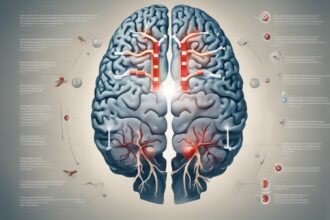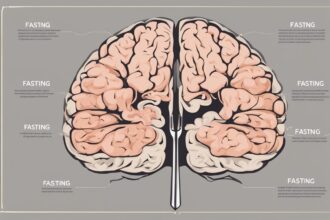Fasting has gained significant attention in recent years, not only for its potential benefits in weight management and metabolic health but also for its profound impact on brain function. The concept of Boosting Cognitive Performance with Fasting is rooted in the idea that periodic abstinence from food can enhance mental clarity, focus, and memory while potentially protecting the brain from age-related decline. In this comprehensive guide, we’ll explore how fasting influences brain health, the science behind its cognitive benefits, and practical ways to incorporate it into your lifestyle.
The Science Behind Fasting and Brain Health
Fasting, whether intermittent or prolonged, triggers a cascade of biological processes that can benefit the brain. When the body is deprived of food for a certain period, it shifts from using glucose as its primary energy source to burning stored fats, producing ketones. Ketones are a type of molecule that can cross the blood-brain barrier and serve as an efficient fuel source for brain cells. This metabolic switch is believed to play a key role in Boosting Cognitive Performance with Fasting by enhancing neuronal resilience and reducing oxidative stress.
Additionally, fasting promotes autophagy, a cellular “clean-up” process that removes damaged proteins and organelles. This mechanism is particularly important for brain health, as it helps prevent the accumulation of toxic proteins associated with neurodegenerative diseases like Alzheimer’s and Parkinson’s. By supporting these protective processes, fasting may sharpen mental acuity and improve overall cognitive function.
How Fasting Enhances Focus and Mental Clarity
One of the most immediate benefits reported by individuals practicing fasting is a heightened sense of focus and mental clarity. This effect is often attributed to the stabilization of blood sugar levels during fasting periods, which prevents the energy spikes and crashes associated with frequent eating. For those seeking ways of Boosting Cognitive Performance with Fasting, this sustained energy can translate into improved productivity and better decision-making.
Moreover, fasting has been shown to increase the production of brain-derived neurotrophic factor (BDNF), a protein that supports the growth and survival of neurons. Higher BDNF levels are linked to improved learning, memory, and overall brain plasticity. If you’re curious about other ways to enhance mental focus, check out our post on Brain-Boosting Nutrition Tips for complementary strategies.
Fasting and Neuroprotection: Guarding Against Cognitive Decline
As we age, the risk of cognitive decline and neurodegenerative disorders increases. Fasting may offer a protective effect by reducing inflammation and oxidative stress—two key drivers of brain aging. Studies suggest that intermittent fasting can lower levels of pro-inflammatory markers in the body, creating a less hostile environment for brain cells. This is a critical aspect of Boosting Cognitive Performance with Fasting, as it supports long-term brain health.
Fasting also enhances insulin sensitivity, which is vital for brain function since insulin resistance is linked to cognitive impairment and conditions like Alzheimer’s disease. By improving how the brain utilizes energy, fasting may help safeguard against memory loss and other age-related cognitive challenges. For more insights on protecting brain health, explore our article on Lifestyle Tips for Optimal Brain Health.
Types of Fasting for Cognitive Benefits
Not all fasting methods are created equal, and choosing the right approach is essential for Boosting Cognitive Performance with Fasting. Here are a few popular fasting protocols that have been studied for their effects on brain health:
- Intermittent Fasting (IF): This involves cycling between periods of eating and fasting, such as the 16/8 method (fasting for 16 hours and eating during an 8-hour window). IF is accessible for beginners and has been linked to improved focus and memory.
- Time-Restricted Eating (TRE): Similar to IF, TRE limits food intake to specific hours of the day, often aligning eating patterns with the body’s circadian rhythm, which may further enhance cognitive benefits.
- Prolonged Fasting: This involves fasting for 24–72 hours or more and is often done under medical supervision. It may trigger deeper levels of ketosis and autophagy, offering more pronounced neuroprotective effects.
Before starting any fasting regimen, it’s wise to consult a healthcare professional, especially if you have underlying health conditions. For additional guidance on fasting methods, read our detailed guide on Intermittent Fasting for Beginners.
Practical Tips for Boosting Cognitive Performance with Fasting
Integrating fasting into your routine for cognitive enhancement doesn’t have to be daunting. Here are some actionable tips to help you get started with Boosting Cognitive Performance with Fasting:
- Start Slow: If you’re new to fasting, begin with a 12-hour overnight fast and gradually extend the fasting window as your body adjusts.
- Stay Hydrated: Dehydration can impair cognitive function, so drink plenty of water, herbal teas, or black coffee during fasting periods.
- Focus on Nutrient-Dense Meals: When breaking your fast, prioritize foods rich in omega-3 fatty acids, antioxidants, and vitamins to support brain health. Learn more in our post on Top Brain Foods to Include in Your Diet.
- Pair Fasting with Mental Exercises: Engage in activities like meditation, puzzles, or reading during fasting periods to maximize cognitive benefits.
Consistency is key, but listen to your body and avoid pushing yourself too hard, as excessive fasting can lead to fatigue or irritability, counteracting the desired effects.
Potential Risks and Considerations
While fasting offers promising benefits for brain health, it’s not suitable for everyone. Individuals with certain medical conditions, such as diabetes, eating disorders, or pregnancy, should avoid fasting unless under strict medical supervision. Even for healthy individuals, improper fasting practices can lead to nutrient deficiencies, low energy, or disrupted sleep, all of which can negatively impact cognitive performance.
When exploring Boosting Cognitive Performance with Fasting, it’s crucial to balance fasting with a nutrient-rich diet and adequate rest. Overdoing it or fasting for extended periods without preparation can do more harm than good. For related information on maintaining overall wellness during fasting, see our article on Fasting and Overall Wellness.
Disclaimer: The information provided in this article is for educational purposes only and should not be considered medical advice. Fasting may not be suitable for everyone, and individual results can vary. Always consult with a healthcare professional or nutritionist before starting any fasting regimen or making significant changes to your diet or lifestyle, especially if you have pre-existing health conditions or are taking medications.
References
- Mattson, M. P., Moehl, K., Ghena, N., Schmaedick, M., & Cheng, A. (2018). Intermittent metabolic switching, neuroplasticity and brain health. Nature Reviews Neuroscience.
- Anton, S. D., Moehl, K., Donahoo, W. T., et al. (2019). Flipping the Metabolic Switch: Understanding and Applying the Health Benefits of Fasting. Frontiers in Aging Neuroscience.
- Harvard Health Publishing. (2018). Intermittent Fasting: Surprising Update.
- Gudden, J., Arias-Vasquez, A., & Bloemendaal, M. (2021). The effects of intermittent fasting on brain and cognitive function. Scientific Reports.
- Mayo Clinic. (2022). Intermittent Fasting: What is it, and how does it work?
This content is for informational purposes only and not a substitute for professional advice.






